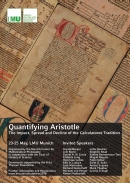Quantifying Aristotle. The Impact, Spread and Decline of the Calculatores Tradition (23-25 May, 2018)

Idea and Motivation
 Our conference will assemble a group of renowned scholars to explore one of the more significant features of the calculatores tradition, namely the way in which it transformed the understanding of Aristotle through its logic-mathematical approach. In addition to focusing on particular texts, authors and questions, we intend above all to consider the diffusion of this intellectual tradition, which for two-hundred years was a determining factor in several scientific and philosophical fields.
Our conference will assemble a group of renowned scholars to explore one of the more significant features of the calculatores tradition, namely the way in which it transformed the understanding of Aristotle through its logic-mathematical approach. In addition to focusing on particular texts, authors and questions, we intend above all to consider the diffusion of this intellectual tradition, which for two-hundred years was a determining factor in several scientific and philosophical fields.
The conference is organized by the Munich Center for Mathematical Philosophy in collaboration with the Chair of History of Science.
Program
Wednesday, 23 May
| Time | Topic | Chair |
|---|---|---|
| 10:00 - 10:30 | Welcome & Registration | - |
| 10:30 - 11:00 | Introduction | - |
| 11:00 - 11:45 | Elżbieta Jung: The New Interpretation of Aristotle. Richard Kilvington, Thomas Bradwardine and The New Rule of Motion | Edith D. Sylla |
| 11:45 - 12:30 | Edit A. Lukács: The Mathematical Theory of Proportions in Thomas Bradwardine´s De causa Dei, Book I | Edith D. Sylla |
| 12:30 - 14:30 | Lunch Break | - |
| 14:30 - 15:15 | José Meirinhos: The Falsigraphus in Thomas Bradwardine’s De continuo | Kärin Nickelsen |
| 15:15 - 16:00 | Magali Roques: Ockham and Bradwardine on propositions de incipit et desinit | Kärin Nickelsen |
| 16:00 - 16:30 | Coffee Break | - |
| 16:30 - 17:15 | Robert Podkoński: The Opuscula de motu ascribed to Richard Swineshead – the testimony of the ongoing development of the Oxford Calculators’s science of motion | Sabine Rommevaux-Tani |
| 17:15 - 18:00 | Fabio Seller: The “rules” of motus difformis in Angelo da Fossambruno’s De tribus praedicamentis Hentisberi | Sabine Rommevaux-Tani |
| 18:15 - 19:30 | Reception | - |
Thursday, 24 May
| Time | Topic | Chair |
|---|---|---|
| 09:45 - 10:30 | Stephen Read: The Calculators on the Insolubles: Bradwardine, Kilvington, Swyneshed, Heytesbury and Dumbleton | Paolo Mancosu |
| 10:30 - 11:00 | Coffee Break | - |
| 11:00 - 11:45 | Mark Thakkar: Wyclif and the Oxford Calculators | Edit A. Lukács |
| 11:45 - 12:30 | Harald Berger: Zur Rezeption der englischen Logik an zentraleuropäischen Universitäten: Helmoldus de Zoltwedel (Prag, Leipzig) über die Lügner-Paradoxie | Edit A. Lukács |
| 12:30 - 14:30 | Lunch Break | - |
| 14:30 - 15:15 | Cecilia Trifogli: Thomas Wylton and Walter Burley on the Incipit and Desinit of an Instant of Time | Peter Adamson |
| 15:15 - 16:00 | Mischa von Perger: Albert of Saxony and the idea of indivisible points of space and time | Peter Adamson |
| 16:00 - 16:30 | Coffee Break | - |
| 16:30 - 17:15 | Aníbal Szapiro: The Calculators' Tradition and the Geometrisation of Light in Oresme's De visione stellarum | Elżbieta Jung |
| 17:15 - 18:00 | Daniel A. Di Liscia: The Geometrisation of Theology and the Metaphysics in the tradition de perfectione specierum | Elżbieta Jung |
| 19:30 | Conference Dinner | - |
Friday, 25 May
| Time | Topic | Chair |
|---|---|---|
| 09:00 - 09:45 | Sabine Rommevaux-Tani: Les questions sur le mouvement local dans le traité anonyme De sex inconvenientibus | Sabrina Ebbersmeyer |
| 09:45 - 10:30 | Joël Biard: Le calcul des variations de qualités et la physique aristotélicienne selon Blaise de Parme | Sabrina Ebbersmeyer |
| 10:30 - 11:00 | Coffee Break | - |
| 11:00 - 11:45 | Richard Oosterhoff: How Humanists Repurposed the Calculatores in Renaissance Paris | Stephen Read |
| 11:45 - 12:30 | Henrique Leitão: Mathematics and Motion in Alvarus Thomas' Liber de triplici motu (1509) | Stephen Read |
| 12:30 - 14:30 | Lunch Break | - |
| 14:30 - 15:15 | Edith D. Sylla: Leibniz, the Liber Calculationum, and Mathematical Physics | Daniel A. Di Liscia |
| 15:15 - 16:00 | Concluding discussion | - |
Acknowledgement
The conference is generously funded by the Fritz Thyssen Stiftung für Wissenschaftsförderung. The Calcultores Project gratefully acknowledges support from the Deutsche Forschungsgemeinschaft. The MCMP gratefully acknowledges support from the the Alexander von Humboldt Foundation.
Photo Credits
1. The beginnig of Richard Swineshead’s Liber calculationum (Padua 1477, fol. 2r).
With permission of the Bayerische Staatsbibliothek, Sign. 2
Inc.s.a.1101 : http://nbn-resolving.de/urn:nbn:de:bvb:12-bsb00069564-6
Some rights reserved (desaturated from original).
2. From Richard Swineshead’s Liber calculationum (Venice, 1520, fol. 6v).
With permission of the Bayerische Staatsbibliothek, Sign. 2
P.lat.1518m#Beibd.2.: http://www.mdz-nbn-resolving.de/urn/resolver.pl?urn=urn:nbn:de:bvb:12-bsb10149301-7
Out of copyright - non commercial re-use (desaturated from original).

